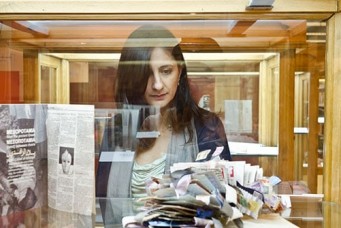A Woman’s Place
Merna Thomas is the co-founder of a feminist group called Noon El-Neswa, or Her, which aims to harness the bourgeoning use of street art as a protest tool to challenge gender stereotypes and generally ignite debate about the place of women in Egypt. One of the most striking images produced by Noon El-Neswa activists is a stenciled triptych of three women wearing no veil, a hijab, and a face veil, respectively, with the admonition: “Don’t label me.” Sometimes a few words of text cry out against misogyny, such as the scrawl declaring “Nothing is for men only” seen around Cairo lately.
Merna Thomas, a twenty-four-year-old activist, heads out for another day of revolution. Armed with brushes and small buckets of paint, her goal today is not the overthrow of a regime, but something perhaps even more daring: to change Egyptian attitudes toward women. On the side of a downtown building, she puts her graffiti skills to work with an illustration of Samira Ibrahim—hailed for bravely speaking out after becoming one of the victims of the infamous virginity tests that Egyptian security forces performed on detained female protesters in 2011. Passersby mumble streams of complaints. “Surprisingly, women were against the idea,” Thomas recalls. “One woman started yelling.”
Thomas is the co-founder of a feminist group called Noon El-Neswa, or Her, which aims to harness the bourgeoning use of street art as a protest tool to challenge gender stereotypes and generally ignite debate about the place of women in Egypt. One of the most striking images produced by Noon El-Neswa activists is a stenciled triptych of three women wearing no veil, a hijab, and a face veil, respectively, with the admonition: “Don’t label me.” Sometimes a few words of text cry out against misogyny, such as the scrawl declaring “Nothing is for men only” seen around Cairo lately.
Perhaps Noon El-Neswa’s most important goal is to boost women’s pride and confidence. The messages, Thomas explains, are intended to fight the sense of being degraded by society, to convey that sexual harassment should not leave them feeling passive and inferior to men. The group has painted portraits of women achievers on walls all around the city; Egyptian icons such as the diva Umm Kalthoum and famed actress Faten Hamama. Their heroes come not only from the past but include remarkable Egyptian women of the present, like factory worker Wedad El-Demerdash, one of the leaders of the 2008 labor strike in the city of Mahalla al-Kubra that presaged the January 25 revolution. To locate inspirational sayings by Egyptian women that can be appropriated for graffiti, activists pour through literature and history books and even watch old Egyptian films with famous actresses portraying strong women characters.
Noon El-Neswa is intentionally provocative, pushing out beyond the revolutionary scene around Tahrir Square and into neighborhoods where promoting women’s empowerment is bound to be even more controversial. One day, in the impoverished district of Dar El-Salaam, an aggressive group of men circled Thomas as she was daubing her opinions on the side of a police station. A more dangerous situation developed in May when Noon El-Neswa had to completely abandon a graffiti initiative in Mahalla Al-Kubra; earlier, residents there assaulted graffiti artists who were part of a “Liar Muslim Brotherhood” campaign. To Shady Khalil, another co-founder, the hostile reaction is expected and plays a useful function. “If someone comes and rubs out the graffiti, it means that I stimulated their stagnant ideas,” he explains.
Thomas literally embodies one of Noon El-Neswa’s core objectives—to see more women out in the streets, reclaiming public space, both as women protesters and simply as Egyptian women. She helped come up with the idea of establishing Noon El-Neswa as an activist group for women’s empowerment after she came across a disturbing graffiti image in downtown Cairo. It portrayed the American Statue of Liberty wearing a face veil, emblazoned with the words “You are not free.”
“Many things in our heritage convey the powerful role of women,” Thomas says. “I want women to get the feeling of, ‘I exist.’”



